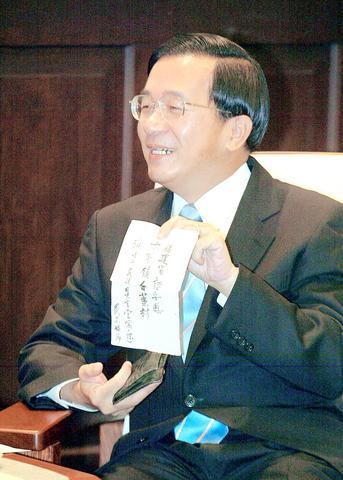President Chen Shui-bian (陳水扁) yesterday compared the Chinese Communist Party's rule to those of ancient Chinese imperial dynasties, saying that the "dictatorial empire" developed by Beijing would collapse sooner or later.
"The `one China' policy is actually a political myth to be used for consolidating the new `Chinese Empire,'" Chen said when he met Ross Terrill, author of The New Chinese Empire and head researcher at Harvard University's Fairbank Center for East Asian Research.
"I have noticed that the book pointed out the fact that the concept of `China' was born in late phase of the Manchu Dynasty, not 5,000 years ago," Chen said.

PHOTO: CNA
"And I agree with the perspective that the major difference between a modern nation and an empire is how they are created: an empire is built on military force while a modern state is born on the basis of all inhabitants' approval," Chen said.
"Therefore, the Chinese Communist regime, which is nothing but a reproduction of an ancient Chinese autocratic empire, will fall someday as its imperial predecessors in Chinese history did."
During the meeting, Chen endorsed Terrill's many points of view in his book, and he urged China to learn from Taiwan's democratic experiences.
In his book, Terrill says that the end of the Chinese party-state is at hand. He points to a number of conditions that might lead to the collapse of China, some of which played key roles in the fall of earlier dynasties, such as the Chinese polity's inability to handle succession and legitimacy issues; a revolt by farmers, especially in the peripheral provinces; and the emperor's misjudgment of the power of outsiders.
Chen also echoed Vice President Annette Lu (
"Though my ancestral home was in Shao-an County (
"Where my ancestors came from is one thing, but nationalistic identification is another, and they should not be confused," Chen said.
He said that the concept of China is significant in the fields of culture, civilization and even the way of life.
"But a political `China' will be built through democratic procedures, especially relying on the development of democracy," he said.
Terrill agreed that every election in Taiwan had facilitated the consensus of a new nationalistic identification.
Meanwhile, Chen reaffirmed that his promise of writing a new constitution was an undertaking in line with democratic processes and should not be described as a timetable for Taiwan independence.
"Beijing assumes that Taiwan's democratic reform, including the realization of a new constitution for meeting Taiwan's reality, is a move toward independence," Chen said.
"It is immoral and irresponsible," Chen added, "and the constitutional move will not be postponed because of Beijing's opposition."

ENDEAVOR MANTA: The ship is programmed to automatically return to its designated home port and would self-destruct if seized by another party The Endeavor Manta, Taiwan’s first military-specification uncrewed surface vehicle (USV) tailor-made to operate in the Taiwan Strait in a bid to bolster the nation’s asymmetric combat capabilities made its first appearance at Kaohsiung’s Singda Harbor yesterday. Taking inspiration from Ukraine’s navy, which is using USVs to force Russia’s Black Sea fleet to take shelter within its own ports, CSBC Taiwan (台灣國際造船) established a research and development unit on USVs last year, CSBC chairman Huang Cheng-hung (黃正弘) said. With the exception of the satellite guidance system and the outboard motors — which were purchased from foreign companies that were not affiliated with Chinese-funded

PERMIT REVOKED: The influencer at a news conference said the National Immigration Agency was infringing on human rights and persecuting Chinese spouses Chinese influencer “Yaya in Taiwan” (亞亞在台灣) yesterday evening voluntarily left Taiwan, despite saying yesterday morning that she had “no intention” of leaving after her residence permit was revoked over her comments on Taiwan being “unified” with China by military force. The Ministry of the Interior yesterday had said that it could forcibly deport the influencer at midnight, but was considering taking a more flexible approach and beginning procedures this morning. The influencer, whose given name is Liu Zhenya (劉振亞), departed on a 8:45pm flight from Taipei International Airport (Songshan airport) to Fuzhou, China. Liu held a news conference at the airport at 7pm,

AIR SUPPORT: The Ministry of National Defense thanked the US for the delivery, adding that it was an indicator of the White House’s commitment to the Taiwan Relations Act Deputy Minister of National Defense Po Horng-huei (柏鴻輝) and Representative to the US Alexander Yui on Friday attended a delivery ceremony for the first of Taiwan’s long-awaited 66 F-16C/D Block 70 jets at a Lockheed Martin Corp factory in Greenville, South Carolina. “We are so proud to be the global home of the F-16 and to support Taiwan’s air defense capabilities,” US Representative William Timmons wrote on X, alongside a photograph of Taiwanese and US officials at the event. The F-16C/D Block 70 jets Taiwan ordered have the same capabilities as aircraft that had been upgraded to F-16Vs. The batch of Lockheed Martin

GRIDLOCK: The National Fire Agency’s Special Search and Rescue team is on standby to travel to the countries to help out with the rescue effort A powerful earthquake rocked Myanmar and neighboring Thailand yesterday, killing at least three people in Bangkok and burying dozens when a high-rise building under construction collapsed. Footage shared on social media from Myanmar’s second-largest city showed widespread destruction, raising fears that many were trapped under the rubble or killed. The magnitude 7.7 earthquake, with an epicenter near Mandalay in Myanmar, struck at midday and was followed by a strong magnitude 6.4 aftershock. The extent of death, injury and destruction — especially in Myanmar, which is embroiled in a civil war and where information is tightly controlled at the best of times —